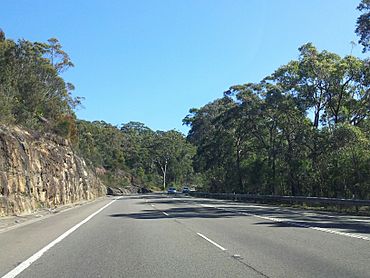Lucas Heights, New South Wales facts for kids
Quick facts for kids Lucas HeightsSydney, New South Wales |
|||||||||||||||
|---|---|---|---|---|---|---|---|---|---|---|---|---|---|---|---|

Heathcote Road
|
|||||||||||||||
| Postcode(s) | 2234 | ||||||||||||||
| Elevation | 151 m (495 ft) | ||||||||||||||
| Location | 31 km (19 mi) south-west of Sydney CBD | ||||||||||||||
| LGA(s) | Sutherland Shire | ||||||||||||||
| State electorate(s) | Holsworthy | ||||||||||||||
| Federal Division(s) | Hughes | ||||||||||||||
|
|||||||||||||||
Lucas Heights is a suburb located in southern Sydney, in the state of New South Wales, Australia. It is found close to the beautiful Royal National Park.
Contents
Exploring Lucas Heights' Location
Lucas Heights is about 31 kilometres south-west of the main city area, known as the Sydney central business district. It is part of the Sutherland Shire, which is a local government area. The suburb sits along the Woronora River, a river that flows north into the larger Georges River.
What's interesting about Lucas Heights is that it doesn't have homes where people live. The part of Lucas Heights that used to have houses was renamed Barden Ridge in 1996. This change happened so that the area would not be directly linked to the High Flux Australian Reactor (HIFAR), which helped increase property values.
The Story Behind the Name
Lucas Heights was named after a man called John Lucas Senior. He was a flour miller who received a large piece of land in 1823. This land was about 150 acres (0.6 square kilometres) and was located near the Georges River.
John Lucas Senior built a special mill that used water power to grind corn. This corn came from farms in the Illawarra region. Small ships would sail up the coast, through Botany Bay, and into the Georges River and Woronora River to bring the corn to his mill.
Science and Waste Management in Lucas Heights
Lucas Heights is best known for being home to the Australian Nuclear Science and Technology Organisation (ANSTO). This is a major research centre that was first set up by the Australian Atomic Energy Commission. It was once home to the important HIFAR research nuclear reactor.
The HIFAR reactor was turned off in January 2007. It was replaced by a newer and more advanced research reactor called OPAL. The OPAL reactor has amazing facilities for studying neutron radiation. Scientists from all over the world come to work here, and many research groups use its equipment.
After the OPAL reactor uses its fuel, the used fuel is sent to Port Kembla. From there, it is shipped to France to be reprocessed, which means it is treated to be used again or safely stored.
The Australian Institute of Nuclear Science and Engineering (AINSE) also has its main office at Lucas Heights. This institute helps support nuclear science and engineering research in Australia.
Besides the nuclear research centre, Lucas Heights also has a large waste-management facility. This facility is not nuclear and has been a key place for disposing of waste for many years.
Understanding the Climate
Lucas Heights is located at a higher elevation compared to many other places in Sydney. Because of this, its climate is a mix between an oceanic climate (Cfb) and a Humid subtropical climate (Cfa). This means it has mild temperatures and rainfall throughout the year.
| Climate data for Lucas Heights | |||||||||||||
|---|---|---|---|---|---|---|---|---|---|---|---|---|---|
| Month | Jan | Feb | Mar | Apr | May | Jun | Jul | Aug | Sep | Oct | Nov | Dec | Year |
| Record high °C (°F) | 41.2 (106.2) |
42.0 (107.6) |
39.8 (103.6) |
32.4 (90.3) |
26.9 (80.4) |
23.5 (74.3) |
24.0 (75.2) |
28.0 (82.4) |
34.4 (93.9) |
34.0 (93.2) |
41.5 (106.7) |
40.0 (104.0) |
42.0 (107.6) |
| Mean daily maximum °C (°F) | 25.9 (78.6) |
26.0 (78.8) |
24.7 (76.5) |
22.3 (72.1) |
18.9 (66.0) |
16.2 (61.2) |
15.8 (60.4) |
17.2 (63.0) |
19.5 (67.1) |
21.6 (70.9) |
23.4 (74.1) |
25.7 (78.3) |
21.4 (70.5) |
| Mean daily minimum °C (°F) | 17.4 (63.3) |
17.6 (63.7) |
16.1 (61.0) |
13.3 (55.9) |
10.1 (50.2) |
8.2 (46.8) |
6.6 (43.9) |
7.4 (45.3) |
9.4 (48.9) |
11.9 (53.4) |
13.7 (56.7) |
15.9 (60.6) |
12.3 (54.1) |
| Record low °C (°F) | 10.9 (51.6) |
11.1 (52.0) |
8.4 (47.1) |
5.6 (42.1) |
4.3 (39.7) |
−0.5 (31.1) |
−0.6 (30.9) |
1.6 (34.9) |
3.1 (37.6) |
3.5 (38.3) |
6.8 (44.2) |
8.8 (47.8) |
−0.6 (30.9) |
| Average precipitation mm (inches) | 92.5 (3.64) |
104.1 (4.10) |
119.0 (4.69) |
92.0 (3.62) |
79.9 (3.15) |
101.0 (3.98) |
59.6 (2.35) |
67.6 (2.66) |
51.8 (2.04) |
70.2 (2.76) |
92.9 (3.66) |
77.9 (3.07) |
1,007.6 (39.67) |
| Average precipitation days (≥ 0.2 mm) | 10.9 | 11.1 | 11.8 | 9.6 | 9.4 | 9.8 | 7.7 | 7.6 | 7.9 | 9.8 | 10.9 | 10.0 | 116.5 |
| Average relative humidity (%) | 62 | 63 | 63 | 58 | 58 | 61 | 52 | 51 | 52 | 57 | 57 | 57 | 57 |
See also
 In Spanish: Lucas Heights para niños
In Spanish: Lucas Heights para niños
 | Leon Lynch |
 | Milton P. Webster |
 | Ferdinand Smith |

